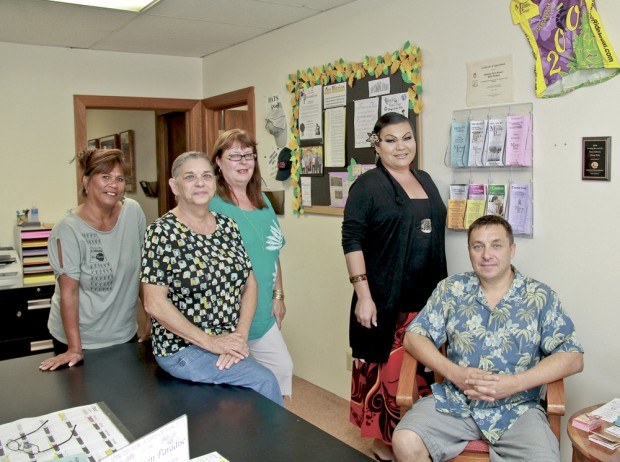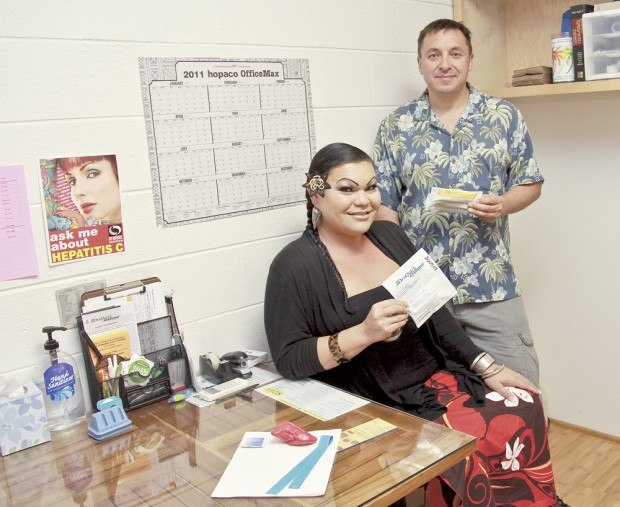LIHU‘E — D.Q. Jackson voices pride in the public impact and financial viability of Malama Pono, the nonprofit social service agency working to stop the spread of HIV/AIDS, sexually transmitted diseases and infectious hepatitis on Kaua‘i. Despite cuts in federal
LIHU‘E — D.Q. Jackson voices pride in the public impact and financial viability of Malama Pono, the nonprofit social service agency working to stop the spread of HIV/AIDS, sexually transmitted diseases and infectious hepatitis on Kaua‘i. Despite cuts in federal funding, the agency is going ahead at full steam.
“We are the most successful community-based organization on Kaua‘i,” said Jackson, the executive director of Malama Pono Health Services, 4357 Rice St., Lihu‘e. “We’ve reduced the HIV/AIDS problem to nearly zero.”
Before joining Malama Pono five years ago, Jackson was a registered nurse who spent 20 years working in emergency care at Wilcox Memorial Hospital.
In the past three years, Jackson said Malama Pono has only had one positive test for HIV and two diagnoses for AIDS.
He credits two factors for the success of Malama Pono.
“We’ve had an extremely effective disease prevention program by our staff,” he said. “They go out and work the harbors, bars and public areas used for drinking, drugs and sex, like where the ‘Pine Tree Inn’ stood until recently. These are good places to spread disease.”
He added, “Basic public health disease prevention services work really well on an island.”
The second factor, he said, is a “remarkable partnership” with the state Department of Health STD/AIDS Prevention Branch and other STD programs on other islands in the state.
“Rather than compete for turf and funding like on the Mainland, we all work together in Hawai‘i in a very concerted and directed way,” Jackson said. “What we do here is very rare.”
Statewide cooperation explains why the per capita rate for HIV infection and AIDS diagnoses in all of Hawai‘i is half that of the Mainland, he said.
As proof, Jackson cites the infection rate for hepatitis-C on Kaua‘i. “Among (intravenous)] drug users over age 30, the infection rate for Hep-C is 76 percent, but among IV drug users under age 30, the Hep-C infection rate is only 16 percent.”
The difference between the age groups is because Malama Pono started an intervention effort 15 years ago that includes a syringe exchange program. “The older addicts were already infected before we began our intervention and exchange efforts.”
Because of the relatively modest amounts being spent on prevention compared to the millions that would otherwise have to be spent on medical treatment, Jackson said, “Hawai‘i and the people of Kaua‘i are damn well getting their money’s worth out of Malama Pono.”
The financial effectiveness of Malama Pono is an issue because the federal Centers for Disease Control and Prevention in Atlanta has reduced HIV/AIDS prevention funding to Hawai‘i by 66 percent over the next three years.
“I find the cuts extremely ironic,” Jackson said. “They say we don’t have a significant HIV/AIDS problem here as compared to Los Angeles or Washington, D.C. The irony is that the CDC is reducing our prevention funding exactly because we have been so effective at reducing the spread of HIV/AIDS on Kaua‘i and in Hawai‘i.”
Jackson seems stoic on the funding cutback. “We are looking at 22 percent cuts in CDC prevention funding each year for three years, and that’s a relatively small amount of our total budget.”
Malama Pono has a $600,000 annual operating budget, of which the CDC has contributed $116,000 a year. The CDC portion will drop over the next three years by 66 percent to about $40,000 annually.
The good news is that Malama Pono will make up for the lost funds from other sources, according to Jackson. “We’ll make it up through donations from fundraising, grants from foundations, and with support from other agencies. And we continue to have other state and federal funding for HIV/AIDS and Hep-C services.”
He said the agency already has several grant applications pending, and they are waiting for answers. “We know we will get approved, given our record, but we don’t know by which foundations.”
The agency will continue to be producing major fundraisers on the island, such as the 6th annual Paradise Ride Kaua‘i, Aug. 4-5. Riders involved with the bicycling event are collecting donations through Aug. 31.
Another response to the cutback is a change in how the board of directors will operate from now on.
“The board basically reinvented itself about three weeks ago,” he said.
“The members have formed themselves into fundraising, finance and public relations committees prepared for anything that might be thrown at them, so we can stay solvent, stable and continue to fulfill our mission.”
The board restructuring into three functional committees, Jackson said, “will help us stay nimble and vital as all community-based organizations face cuts in government funding. We are the only nonprofit board on the island to have done this, as far as we know, but we likely won’t be the last.”
Meanwhile, Malama Pono continues to offer health services across the Garden Island.
Although the agency does not provide medical treatment, its case management services include needs assessment, service planning, linkage and referral to community resources, coordination of benefits, nutritional and treatment education, food pantry access, plus emergency financial assistance for HIV positive individuals and their families.
One of these clients is Jeff Demma, the former interim director and treasurer of the agency.
“I’ve been HIV positive for many years,” he said, “but until the financial crisis hit a few years ago, I never thought I would need to become a client.”
Among other services, Malama Pono assists Demma by special ordering from the Mainland many of the costly nutrition supplements he takes daily.
“You should see all the bottles lined up when I load my pill box for the week,” he said. “Malama Pono helps me stay healthy, and I really am healthy now.”
By going public with his infection, Demma is among those who have helped reduce the stigma of HIV/AIDS, Jackson said.
“We are seeing a marked increase in the people coming forward to be tested and requesting support services, including hospice, partly because of our major public relations effort in 2009 and 2010.”
Malama Pono has a public education and services partnership with Kaua‘i Hospice and the YWCA, he said. “We are a lot more effective by working together than either of us could be as a stand-alone agency.”
From now on, Jackson said, “Collaboration versus competition will be the salvation of all community-based organizations.”



